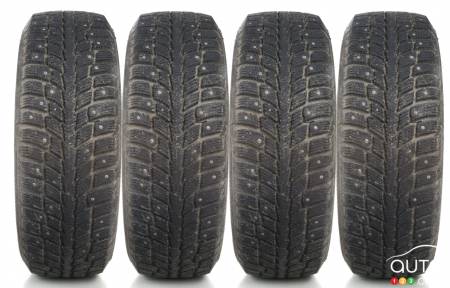If there was one single winter tire so versatile that it could meet every driver’s needs, you would not be reading these lines. Unfortunately, such a tire does not exist… yet! However, it is still possible to find winter tires that perfectly suit your needs if you look for the right thing.
Of all the tires on the market, studded tires might be a great option for you. Contrary to popular belief, studded tires are allowed everywhere in Canada during winter (the exact dates vary depending on the province), except in southern Ontario. According to your location and your commuting habits, maybe you could benefit from that type of tire.
Without further ado, here is what you need to know about studded tires.
A strong comeback
Studded tires almost disappeared when specialized winter tires with enhanced traction on ice were created. However, in the past few years, tires with studs have become increasingly popular. This is partly explained by the fact that some manufacturers now install the studs directly at the factory, like a few European manufacturers that sell tires with a studded tread. Retailers can also stud select tires that were specifically designed for this type of upgrade.
Are studded tires a good fit for your car?
When shopping for winter tires, you should start by considering your commuting habits. Do you mostly drive in the city, on highways or on secondary roads?
If you live in a rural area, often use secondary roads and sometimes visit ski resorts in the weekend, studded tires may save you some trouble. You will feel safer with this type of tire because it provides effective braking and enhanced grip on ice.
Conversely, if you mostly drive in a city where paved roads are rarely covered with ice or snow, traditional winter tires are certainly a better option for you.
If you choose to install studded tires on your car, you have the legal obligation to change all four of them. Moreover, you should know that studded tires are forbidden in several parking garages and underground parking lots.
Factory- or retailer-studded?
If you plan on buying studded tires, note that the studs may have been installed by the manufacturer directly at the factory or by the retailer/distributor. Both types of studded tires have pros and cons, but what really matters are things like road noise, performance and durability.
Tires that are studded by the manufacturer are undoubtedly of better quality. They provide superior performance, increased durability and a quieter ride. Because of their particular shape that optimizes contact with the road, the studs in those tires offer a smoother ride and enhanced traction. This technology was developed by European manufacturers to contribute to a more efficient and versatile tire.
Some people prefer tires that are studded by the retailer because they are cheaper. However, they are also louder and less durable. Significantly more basic, these tires’ studs produce a greater impact on the ground which makes them louder. The main advantage of tires studded by the retailer is that you can purchase an average-quality tire and have studs installed afterwards at a much cheaper cost
Making the right choice
To sum up, drivers who regularly drive on snowy, icy or poorly maintained roads should think about getting studded tires. They ensure significantly shorter braking distances and give you better handling in dangerous conditions. If you plan on keeping your car for several years, you should know that tires studded by the manufacturer are a better investment. However, if you have a tighter budget, you can purchase average winter tires and get them studded afterwards. They are more affordable and provide good performance.








